Community Education
Success of student-run Cool Kids Café shows why schools need more paraeducators
Hans Cagabcab carefully carried a hot drink down the hall of Goodman Middle School on Friday, delivering the beverage with a smile to school counselor Erika Nemecek.
Education Sponsor
Education stories are made possible in part by Tacoma Community College, a proud sponsor of Gig Harbor Now.
Cagabcab, who is in eighth grade, pushed a button on his assistive tablet, and the device issued a recording thanking Nemecek for her order.
Cagabcab is a greeter and delivery worker at the Cool Kids Café, a student-run operation that’s part of Peninsula schools’ Options Program. The cafe teaches life skills to students with special needs.
Coffee and more
On most mornings, Cagabcab is also the opener. With help from his one-on-one paraeducator Meagan Crum, he gets the counter ready for business and makes a pot of coffee.
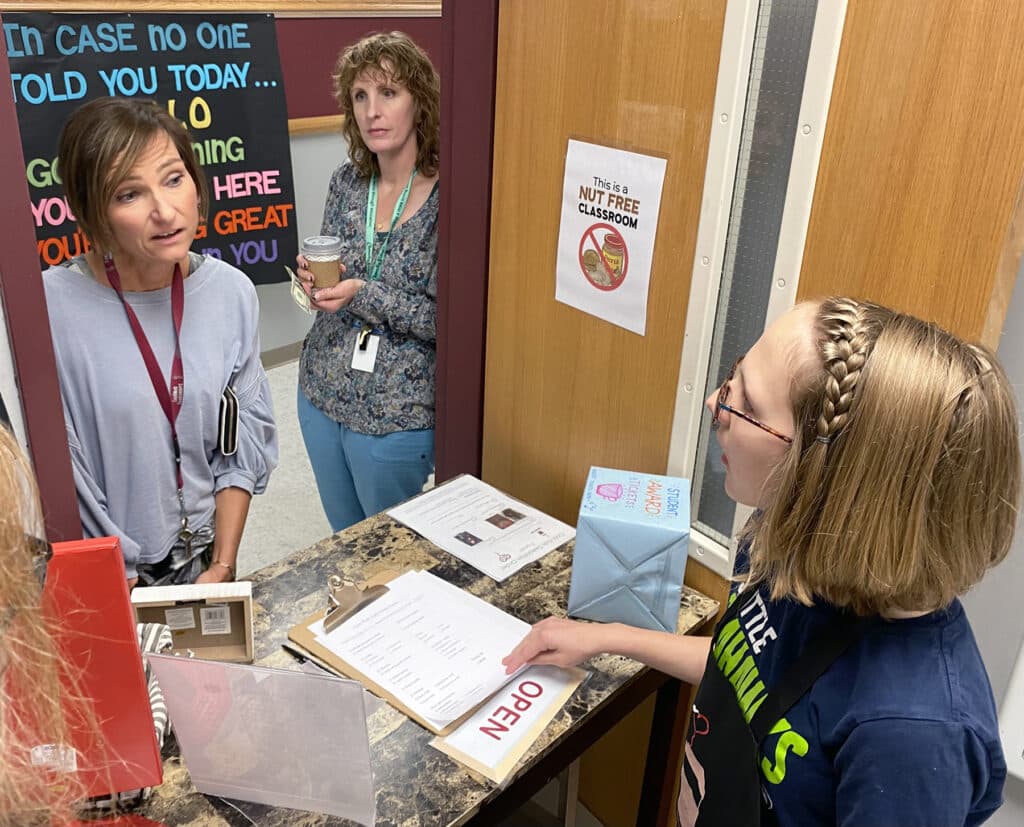
Student Payton Carnahan (right) take an order from school counselor Mirka Kjelstad on Sept. 9, 2022, opening day of the Cool Kids Café, a student-run coffee shop at Goodman Middle School. Christina T Henry
Friday was opening day for the café, now in its third year serving hot drinks, cookies, muffins and other goodies.
The café is known for its bagels and pretzels, baked in-house with dough donated by Harbor Greens. Occasionally the students will host a lunch event for staff, such as last year’s popular baked potato bar.
“I came a lot last year and it was so pleasant and nice,” Nemecek said. “The students really grew over the year. They were delivering all kinds of baked goods and selling muffins and cupcakes and cookies. And it was just really wonderful.”
The café is primarily for staff, but students can earn awards for a free hot cocoa or cider drink. Nutritional standards prohibit the café from serving caffeinated drinks to middle schoolers.
‘Best real-life program’ ever
The Cool Kids Café is the brain child of special education teacher Kari Hyatt, who ran a similar program at Hawkins Middle School in North Mason before moving to Peninsula School District. Teacher Bryn Miller, who previously worked at Hawkins with Hyatt, co-leads the project and helps students manage the budget to operate the café.
Students who work in the café must obtain a state food handlers card. They do everything: plan menus, prepare baked goods, take orders, and make hot cocoa, cider and espresso drinks.
“This is the best real-life program I’ve ever gotten to be a part of. The kids here are learning literally life skills,” said paraeducator Elaine Krejci, who has worked in special education for 25 years. “They do all the marketing, where we make all the signs and advertisements. We also learn about handling money and making change.”
Krejci said students learn skills they need “to be successful in any workplace.”
Teaching transferrable skills
Payton Carnahan and Hazel Finley, working the front counter, took an order from assistant principal Dawn Musgrove. Finley delivered the order slip while Carnahan took Musgrove’s payment.
Finley in eighth grade, Carnahan in seventh. Both worked in the café last year.
“I want to be a barista at Starbuck’s when I grow up,” Carnahan said.
Finley is thinking about a job with McDonald’s.
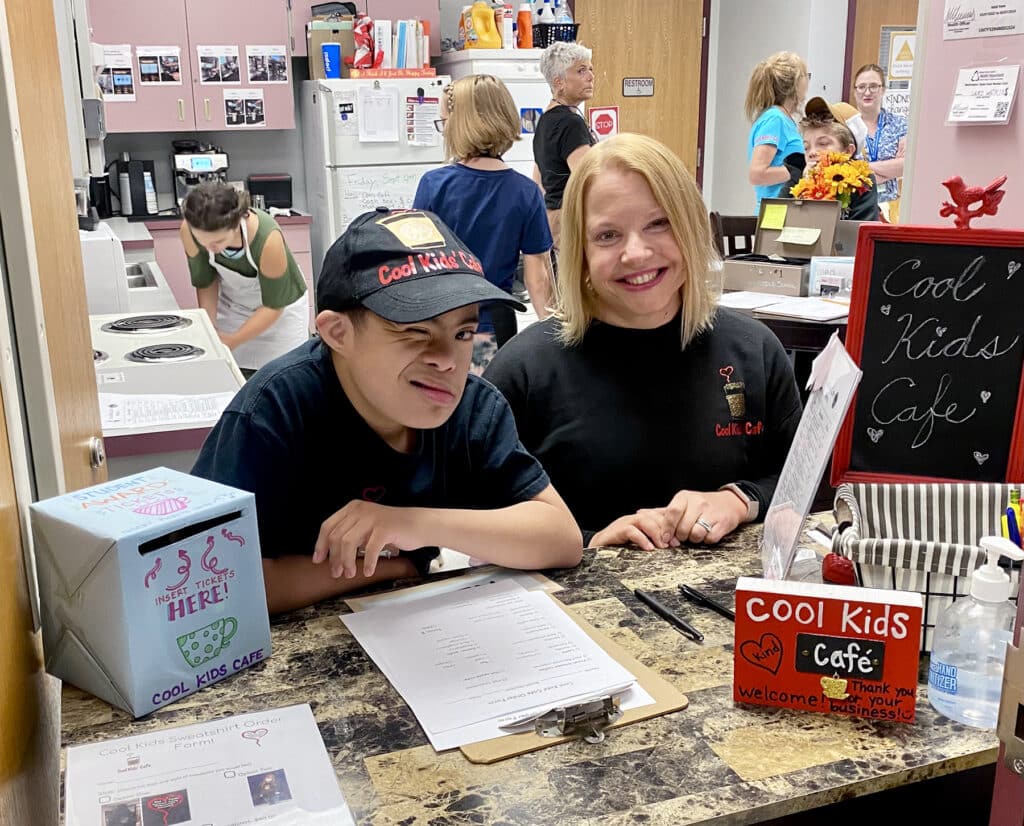
Student Hans Cagabcab and his one-on-one paraeducator Meagan Crum are ready for business on Sept. 9, 2022, opening day of the Cool Kids Café, a student-run coffee shop at Goodman Middle School. Christina T Henry
Working in the café is great preparation for a career in food service. But Hyatt said the intention is to teach students skills that will help them get a job after they graduate, regardless of what that job is.
“So, it’s not like, OK, everybody’s gonna go to Starbucks,” Hyatt said. “It’s like everybody’s gonna understand work ethic. Everybody’s gonna understand what a resume is, an application, how to update the resume. So, the importance of that, how to get promoted, how to get hired.”
There’s a big emphasis on customer service and teamwork. T-shirts and sweatshirts — which the students designed and which are for sale to support the café — display a heart-shaped logo and the values of café staff: “kind, capable, committed, caring, compassionate and connected.”
Students’ ambitions varied
“Order up,” said Finley.
Barista Mackenzie White took the order slip and prepared Musgrove’s drink. Although this was a simple hot cider, White is well versed in whipping up flavored coffees and espresso.
“I really love doing the espresso machine,” said White, an eighth grader now in her second year working the café.
Students rotate jobs, working all stations for which they’re physically capable.
Why did White apply to work in the café?
“Well, I knew I had talent and I’m also good at listening to others,” she said.
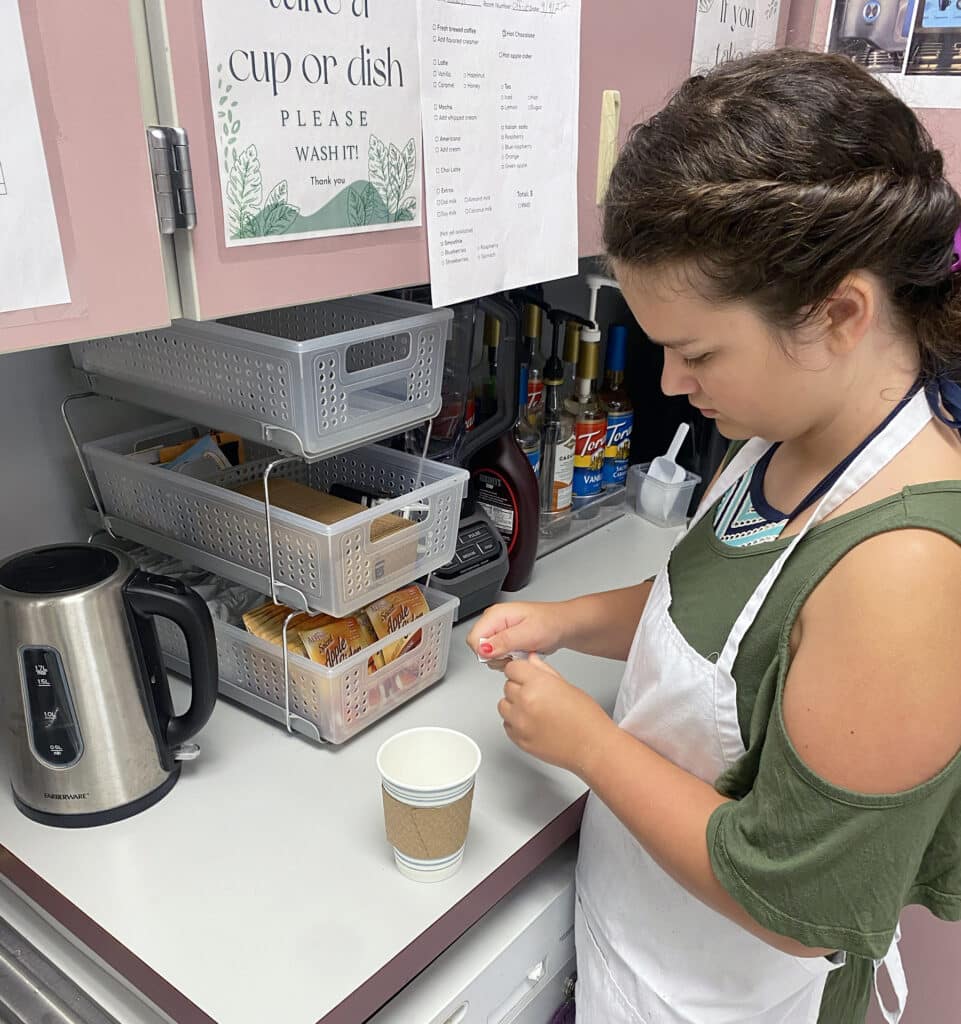
Barista Mackenzie White prepares a hot drink in the Cool Kids Café, a student-run coffee shop at Goodman Middle School. Christina T Henry
But she for a career, she’ll probably look elsewhere.
“Well, my future is always thinking of fashion things,” said White, whose outfit signals her eye for style.
Student Ben Chipman proudly displayed his laminated resume, showing he’s already had work experience as a painter and laborer in a family-owned business. Chipman’s real love, however, is anything with an engine. He’s been working on cars with his dad since he was barely tall enough to look inside the hood. His career ambition is the become a mechanic.
“Some of our kids are going to go to trade school. Some of them might go to college, and some of them might just go right directly into the workforce,” Hyatt said. “But they’re going to understand when you go to work, you get to work on time, you give it your all.”
More paraeducators needed
The Cool Kids Café is just one part of the Options Program, which serves students in sixth through eighth grades with a wide range of abilities and needs.
In a classroom adjacent to the café, students work in small groups and individually with supervision. Some, like Cagabcab, have assigned paraeducators who guide them through their school day.
A number of Options students attend some general education classes. Some of those need a paraeducator to escort them.
At Goodman, there are six adults, including “paras” to teach and supervise about 23 students.
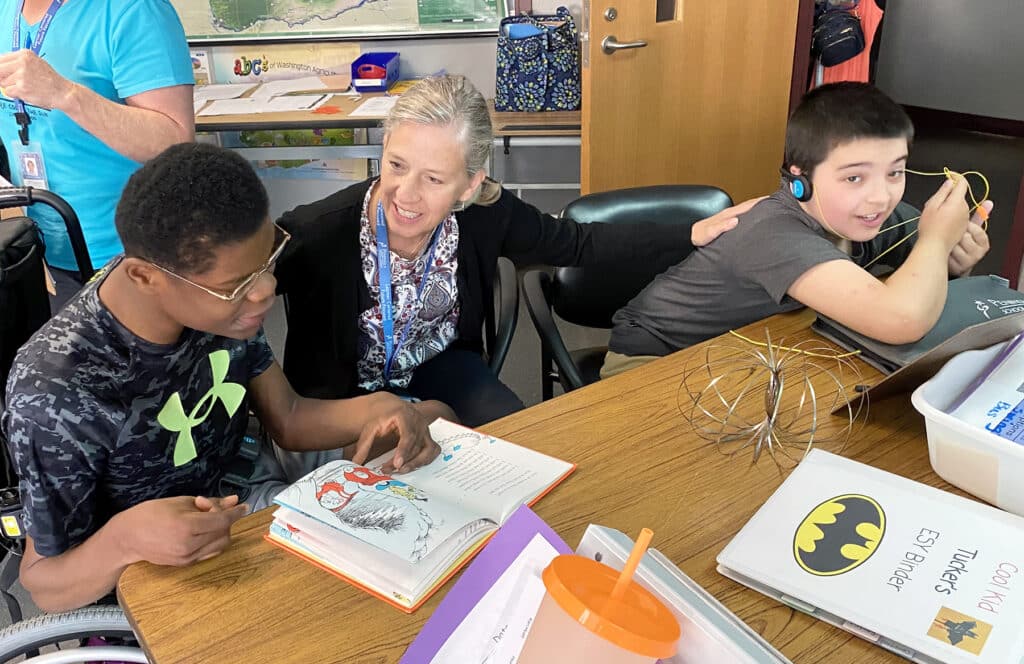
Students Xavier Roscoe (left) and Tucker Meadows work on individual learning projects with help from paraeducator Jennifer Moomaw in the Options classroom at Goodman Middle School on Sept. 9, 2022. Peninsula School District is looking to fill about 40 paraeducator positions, of which 35 are for special education. Christina T Henry
“So, you can see why we need more staff,” Krejci said.
Peninsula School District is recruiting more paraeducators for all its schools, according to HR director Dan Dizon. Paras support teachers by providing additional help and supervision to students who need it.
“We have roughly about 40 paraeducator positions open districtwide, of which 35 would be working with special education students,” Dizon said.
Dizon would like to see paraeducators offered a track to become certified teachers, which would give paras career advancement opportunities and help the district grow its own teaching staff. But first, they have to hire on.
Filling jobs not easy
Like other districts, Peninsula chronically struggles to fill paraeducator positions.
The job requires at least a high school degree plus passing scores on the state’s Para Pro Test or an associate and/or bachelor’s degree. It’s not an easy job.
Requirements include being able to lift and transfer students weighing 100 pounds or more. Paras may need to perform health services such as “gastrointestinal tube feeding using a pump or gravity; administration of oral medication by mouth, feeding tube, inhaler, or nebulizer; use of a magnet over a vagus nerve stimulator (VNS) to control seizures; oral suctioning using a bulb syringe or suction machine,” among other hands-on care, according to the district’s job description for a Para III, working with special education students.
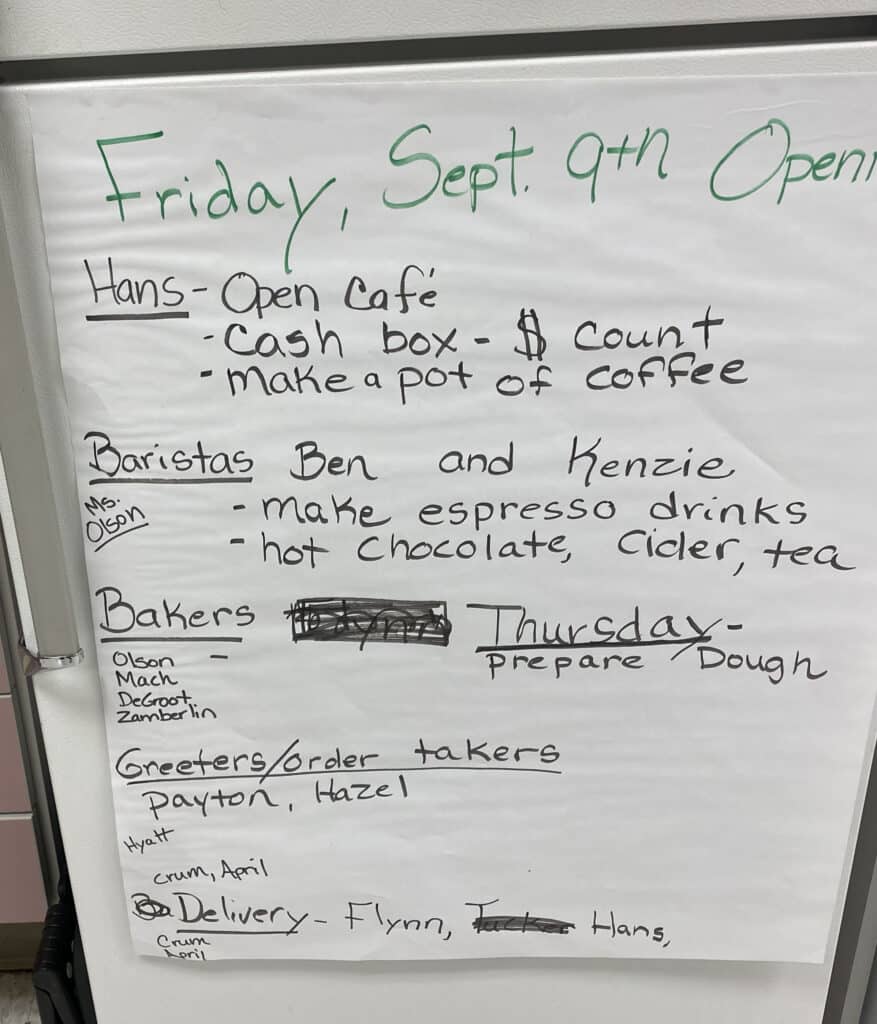
A sign shows job assignments for opening day of the Cool Kids Café on Sept. 9, 2022. Christina T Henry
The job “requires flexibility due to frequent shifts in focus between assignments. Regularly required to deal with angry or upset students.”
“I really love what I do,” said Krejci. “I especially really love working with the kids and you really get to know them and seeing them grow.”
The biggest reason districts can’t hire enough paras?
“Honestly, they need to pay more,” Krejci said. “They really do, especially now with inflation and even the cost of renting a place to live has just skyrocketed.”
Impact of inflation
The current union contract shows entry-level paraeducators making $19.97 per hour before deductions. The top of the scale, top step for a Paraeducator V after 25 years or more, is $34.95 per hour. The scale includes a 5.5% increase for school staff allocated last year by the Legislature, plus 0.5% on top of that under terms of the contract.
Even with the increase, inflation takes a big bite.
“You have to have a heart and you really do, because I don’t know that anybody goes into this profession for the amount of pay,” Krejci said. “And I think that’s always been true, for all the energy and effort you put into it. But now the pay isn’t even enough to where you can take care yourself. It just hasn’t kept pace.”
Krejci says it weren’t for her husband’s job, she would, like so many others, probably look for work elsewhere.
“If I was just my own salary, I wouldn’t be able to have this job. I would not be able to pay my bills,” she said. “And this is where my love is. This is my passion.”
The contract that covers paraeducators, clerical staff and other educational support positions runs through Aug. 31, 2023. Negotiations for the new contract will begin this spring, Dizon said.

Student Hans Cagabcab and his one-on-one paraeducator Meagan Crum are ready for business on Sept. 9, 2022, opening day of the Cool Kids Café, a student-run coffee shop at Goodman Middle School. Christina T Henry

